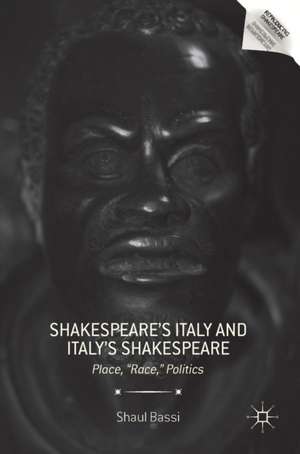Shakespeare’s Italy and Italy’s Shakespeare: Place, "Race," Politics: Reproducing Shakespeare
Autor Shaul Bassien Limba Engleză Hardback – 13 mai 2016
Preț: 583.93 lei
Preț vechi: 686.97 lei
-15% Nou
Puncte Express: 876
Preț estimativ în valută:
111.75€ • 116.24$ • 92.26£
111.75€ • 116.24$ • 92.26£
Carte tipărită la comandă
Livrare economică 15-29 aprilie
Preluare comenzi: 021 569.72.76
Specificații
ISBN-13: 9781137502858
ISBN-10: 1137502851
Pagini: 221
Ilustrații: XI, 231 p. 4 illus., 2 illus. in color.
Dimensiuni: 148 x 210 x 19 mm
Greutate: 0.42 kg
Ediția:1st ed. 2016
Editura: Palgrave Macmillan US
Colecția Palgrave Macmillan
Seria Reproducing Shakespeare
Locul publicării:New York, United States
ISBN-10: 1137502851
Pagini: 221
Ilustrații: XI, 231 p. 4 illus., 2 illus. in color.
Dimensiuni: 148 x 210 x 19 mm
Greutate: 0.42 kg
Ediția:1st ed. 2016
Editura: Palgrave Macmillan US
Colecția Palgrave Macmillan
Seria Reproducing Shakespeare
Locul publicării:New York, United States
Cuprins
Introduction: Country Dispositions.- Part I. "Race".- 1. Iago's Race, Shakespeare's Ethnicities.- Slav-ing Othello.- Shakespeare, Nation, and Race in Fascist Italy.- Part II. Politics.- Neocon and Theoprog: The New Machiavellian Moment.- Infinite Minds: Shakespeare and Giordano Bruno Revisited.- Hamlet in Venice.- Part III. Place.- The Grave and the Ghetto: Shakespearean Places as Adaptations.- Fixed Figures: the Other Moors of Venice.- The Prison-House of Italy: Caesar Must Die.
Notă biografică
Shaul Bassi is Associate Professor of English and postcolonial literature at Ca'Foscari University of Venice, Italy. His publications include Visions of Venice in Shakespeare (with Laura Tosi) and Experiences of Freedom in Postcolonial Literatures and Cultures (with Annalisa Oboe).
Textul de pe ultima copertă
Shakespeare’s Italy and Italy’s Shakespeare revisits a classical topic from a new perspective, focusing on Shakespeare’s afterlife in Italy through the lens of place, “race,” and politics. From discussions of a Victorian racialist interpretation of Shakespeare that casts Iago as the archetypal Italian specimen to Fascist appropriations of Shakespeare to Paolo and Vittorio Taviani’s film Caesar Must Die, Shaul Bassi interrogates how Italy explains Shakespeare and how Shakespeare explains Italy. These peripheral events both illuminate singular potentialities of the plays and turn Shakespeare into a special guide to Italy’s ethos and political unconscious.





























